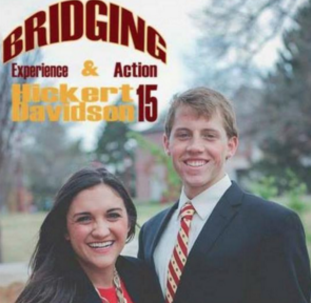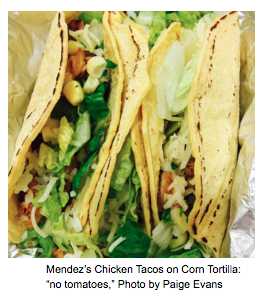At DU’s Undergraduate Student Government (USG) meeting on Tuesday, February 16, Officers and Senators met to discuss DU’s internal affairs and activities. Tess Greenwald, Junior Senator and future English Education graduate student, quietly reported on her upcoming events, only later telling how she was studying each of her fellow Officers and Senators, sizing them up.

The Future
Greenwald, 20, intends to run for USG President this spring, keeping her platform under wraps until she chooses and announces her Vice President and running mate. Meticulous in her selection, she has rejected offers by Alec Fertel, Joe Bellafiore and Gunnar Solberg to be her right hand in the potential USG administration.
Greenwald, after developing and actualizing DU’s Global Reveal on February 19th, said, “a candidate’s VP could make or break them. DU is relatively small, politics is all about relationships and perceptions and being a Senator has shown me how USG should look and feel. I have a lot of big ideas and I need someone who will stimulate more goals and motivate more growth. I want to leave a legacy and who I want that to be with matters to me as much as it would to a US presidential candidate.”
USG elections occur every spring, requiring candidates to run for student body President and Vice President, as a team, with a developed campaign. This year’s elections will take place concurrent to the US presidential campaign cycle, heightening student attention to government and policy programming.
The Present
President Cam Hickert and Vice President Jess Davidson, both seniors, were elected spring 2015 using the campaign: Bridging Experience & Action. Likewise, all USG members won their respective positions after campaigning exhaustively for the 2015 elections and have since implemented initiatives aimed at cultivating a campuswide political climate that enables students to connect with each other and administration.These initiatives include the Founders Celebration, the Global Reveal and the future of Driscoll Student Center.

Large-scale plans to improve student life are in the works for USG, most importantly, concerning the Driscoll Student Center’s redesign and reconstruction, aiming to create space by students, for students.
Jack Arrix, Senior Senator, when asked about his ideas for the hours of the new student center, said that a problem with DU is, “everywhere on campus that people gather is so serious. The library is the only place we know we can all go to see people… we should hate it [there].”
President Hickert, challenged the Senators to collaborate in designing Driscoll’s replacement, emphasizing that their ideas should not be limited by perceived restraints: “dream big.” Groups presented to Officers and Advisors, visualizing the new student center having local and popular food/beverage vendors, a bowling alley, a rotating cultural appreciation floor, quiet space for meditation and relaxation, study space, gender inclusive bathrooms, an interactive touchscreen calendar, chambers for student organizations and other resources–all powered by solar panels and open 24/7. Each stressed that the new center should have a bar where students can safely drink and socialize.
The Culture
The student center conceptualization project marks the first of many enterprises to be devoted to the future student center. USG and its administration attempts to exemplify collectivity, open-mindedness and rapport, indicating political semblance by undertaking projects like renovating the Driscoll student center. The political culture created by Hickert, Davidson and the other USG members elevates personal relationships, as USG’s Officers and Senators are all friends outside the organization. In fact, USG funds its Senators and Officers night-away retreats and Avalanche tickets for each member, stressing the importance of bonding. In order to replicate the Hickert Administration’s ambience amidst heightened student attention to government and policy, the continuation of Driscoll’s remodel and more contemporary program initiatives, USG will need to be structured around friendships.
Having already turned down friends Fertel and Solberg in her campaign for USG President, Greenwald will be facing a change in scenery if she’s elected. While the candidate recognizes the prominence of relationships in politics and genuinely enjoys her time spent in meetings and planning events, Greenwald understands the importance of diversity in choosing her team. Like President Obama’s selection of Joe Biden and John McCain’s selection of Sarah Palin, Greenwald intends to choose a Vice President that is passionate about her platform and can help her to reach untapped corners of the student body.


 tives
tives